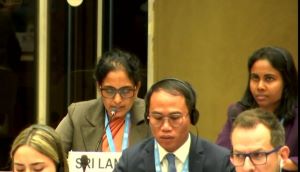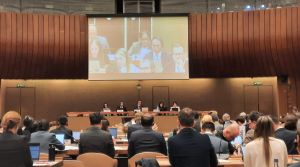

General Intervention by H.E. Himalee Arunatilaka, Ambassador and Permanent Representative of Sri Lanka to the UN in Geneva, on 28 August 2023
Mr. Chair,
Sri Lanka compliments the work accomplished by you as the Chair of this open-ended working group to date, based on the mandate given by General Assembly resolution 76/231. We are thankful to all Member States for their constructive engagement throughout the past sessions towards reaching a substantive outcome of this working group.
Mr. Chair,
Sri Lanka recognizes the common interest of humankind in the exploration and use of outer space for peaceful purposes without discrimination. Sri Lanka has been actively engaging in multilateral efforts for the prevention of an Arms Race in Outer Space (PAROS) over many decades since becoming a signatory to the Outer Space Treaty in 1967. Significantly, Sri Lanka proposed a moratorium on the testing and development of space weapons preceding multilateral negotiations on a treaty to prohibit all weapons in space in 1985.
Furthermore, Sri Lanka has been co-presenting together with Egypt, the UNGA Frist Committee Resolution on ‘Prevention of an Arms Race in Outer Space’ in keeping with our longstanding and principled position on this subject and the promotion of peaceful uses of outer space.
As stated in the PAROS resolution, the current international legal regime pertaining to outer space ‘does not in and of itself guarantee the prevention of an arms race in outer space.’
Today, with the rapid advancement of new space technologies, prevention of an arms race in outer space has become critical. We believe that the mandate of this working group is to make recommendations on possible norms, rules and principles of responsible behaviours which could contribute to the negotiation of a legally binding instrument. Further, we wish to highlight the necessity of effective measures for verification to prevent an arms race in outer space.
Mr. Chair,
Sri Lanka is of the view that the draft report should be strengthened on the need for the development of international law on space security. We also believe that the report should reflect a consensual text and reiterate Sri Lanka’s position that the early negotiation of a legally binding instrument on PAROS should be a priority.
An increasing number of space actors, related emerging new technologies and a fast-blurring line between civilian and military uses of space capacities, give rise to the need to address existing legal gaps in the Outer Space Treaty. Therefore, this open-ended working group needs to recognize the need for further advancement of international law on outer space, building on the existing legal frameworks. We welcome in this regard the recognition of the applicability of relevant treaty and customary international law to outer space activities in the draft report.
Sri Lanka further wishes to underline that the norms, rules and principles developed by the open-ended working group should not provide the ground for any subjective interpretation of existing legal obligations on the conduct in outer space or the possibility for generalization of outer space as a domain for possible conflict, undermining the goal of PAROS.
We reiterate that the working group should highlight the importance of applicability of international law regarding outer space activities. We also believe that Member States should further consider proposing possible norms, rules and principles to address mitigating outer space debris, prevention of militarization of space, and protection of civilians and civilian infrastructure. We should pay extra attention to preventing irresponsible behavior which could have potential impact on international peace, security and stability, as well as interrupting essential civilian services, scientific research and development, climate change adaptation and mitigation and disaster risk prediction.
In keeping with growing international concerns regarding modern outer space capabilities, Sri Lanka calls for the universalization of existing international law applicable to outer space activities.
It is important for our delegation that the OEWG report reiterates the priority need for early negotiation of a comprehensive and non-discriminatory legally binding instrument on PAROS. Voluntary non-binding measures including Transparency and Confidence Building Measures (TCBMs) cannot and should not be a substitute for an international legally binding instrument to prevent an arms race in outer space.
Mr. Chair,
We remain hopeful that the deliberations of this forum would lead to an inclusive and comprehensive consensus outcome report.
Thank you